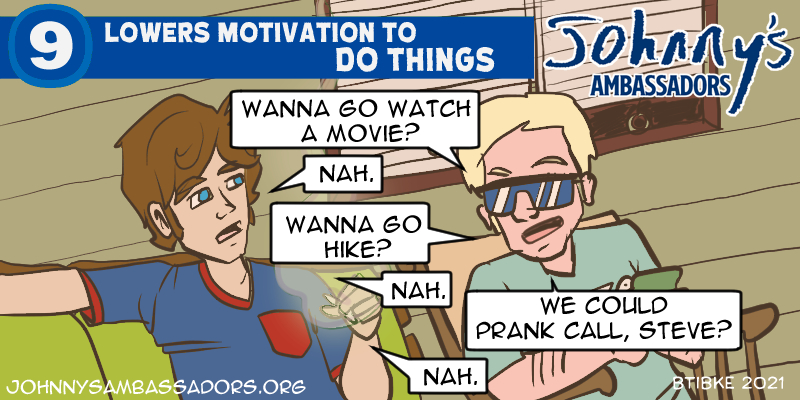By Laura Stack
In 2006, a “Dr. Leth Argos” published a pointed parody article in The BMJ (formerly the British Medical Journal) aimed at the pharmaceutical industry‘s tendency toward disease mongering: i.e., creating and promoting new illnesses in order to sell more products. In the article, “Dr. Argos” (actually Australian medical researcher RJ Moynihan) re-branded laziness as Motivational Deficiency Disorder, which could be cured with a new drug called “Indolebant.” Otherwise, “MoDeD” could be fatal, he claimed, as it “reduces the motivation to breathe.”
Some global news outlets even reported the “disturbingly successful April Fool’s Day prank” as real. Talk about lazy! In 2008, Indolebant returned in a series of video clips in a “Marketing Overdose” campaign.
If only Indolebant really existed—because in a way, MoDeD really does. It’s called amotivational syndrome, and is chiefly associated with drug abuse. Marijuana users are especially prone to it. Think of the stereotypical marijuana; they’re the poster boys for amotivational syndrome. You’ve probably seen it in their slowed speech, laissez-faire attitude, and lack of any serious activity. Among pot users, amotivational syndrome results in changes in personality, cognitive abilities, and emotions. Interest in daily life gradually erodes to a nub. Family life, educational efforts, and job performance can suffer, and then sufferers may become an emotional and financial drain on others. They can function, but tend to be apathetic, lack concentration, and have poor memories—even to the point of short-term amnesia.
Like, Who Cares, Man?
Marijuana advocates and users like to point out that the “stoner” stereotype is based only on how they act when they’re high, not when they’re normally functioning. However, that argument somewhat backfires on them in the face of a 2016 study. University College of London researchers investigated the effects of marijuana on reward processing, in light of the large body of research and anecdotal evidence concerning the life-damaging apathy observed in many users. Their goal was to observe the effects of both THC and CBD on motivation, something not previously done. THC severely affects brain chemistry; CBD apparently does not.
Their research actually involved two smaller studies. The first, involving 17 individuals, involved providing three vaporized treatments to the test subjects at different times. One was cannabis with THC only; the second was cannabis with CDB and THC; and the third was a placebo. In the second study, 20 cannabis-dependent individuals were compared with 20 non-dependent users, in order to see how well they performed on standard reward task studies when not intoxicated.
In the first study, the test subjects given the pure cannabis preparation performed demonstrably worse than those given the other two. Interestingly, high levels of CBD lessened the effect of the THC. In the second study, cannabis-dependent users showed a slightly weaker response than non-dependent users. Overall, as one reporter put it, “Smoking the equivalent of a single ‘spliff’ of cannabis makes people less willing to work for money while ‘high.'” Johnny had a great job at one point that he simply stopped showing up for, because he preferred to get high. Then he didn’t have enough money and would come to me for a hand-out.
Large, long-term surveys have found the same issue of “motivation depletion” damaging self-efficacy. One study of 305 college students who used marijuana revealed that, over time, elements like initiative, persistence, effort, and the user’s belief in their ability to achieve specific goals were impaired. The researchers controlled for 13 different issues, including alcohol use and smoking, demographics, and personality—and still concluded that “only marijuana (but not alcohol or tobacco) intake” was a risk-factor for decreased self-efficacy. In other words, marijuana use demotivated them.
But Wait, There’s More
Amotivational disorder is nothing new. We all know it when we see it. Think of your go-to stoner stereotype; for me, it’s Cheech and Chong. I’ve never found stoner humor especially funny, but to me, they seemed to encapsulate the stoner lifestyle of their time… and much of what they did was related to amotivational syndrome, non-so-coincidentally first described in the 1960s. It’s a chronic condition—with chronic, also not-so-coincidentally, a common term in marijuana culture. Clearly, even users recognize the problem. In addition to the symptoms already outlined, other amotivational syndrome symptoms can include:
- Increased inward focus.
- Decreased volition (a willingness to do things on your own).
- Loss of ambition.
- Incoherence.
- Inattention.
- Social isolation.
Overall, people with amotivational syndrome simply have trouble finding meaning in life. Just as sadly, the marijuana-based version of the syndrome, and the drug that drives it, doesn’t just kill the user’s own motivation. It also kills the motivation of anyone who isn’t a pothead to be around them or otherwise deal with them.
DeMoDeD
One of the worst problems with amotivational syndrome is that once you’re there—not just at rock bottom but below, in the ruts, doing only what’s necessary to get by—it’s very hard to escape. Most sufferers of marijuana amotivation don’t even care that they have the problem. It can be treated via psychotherapy, antidepressants, and sobriety to allow the brain to heal, but for those who began using pot early in life, there seems to be no real cure. This is probably because heavy use damages the brain in several different ways.
People with marijuana amotivational syndrome can get better, but often, they never return to what society considers normal. And it’s easy for them to fall off the wagon and into their bad habits. It takes a concentrated effort by them and their loved ones to re-motivate them into caring about life.
It’s better for them not to go there in the first place. So, watch your young people carefully—and don’t hesitate to step in when you think it’s for their own good.


